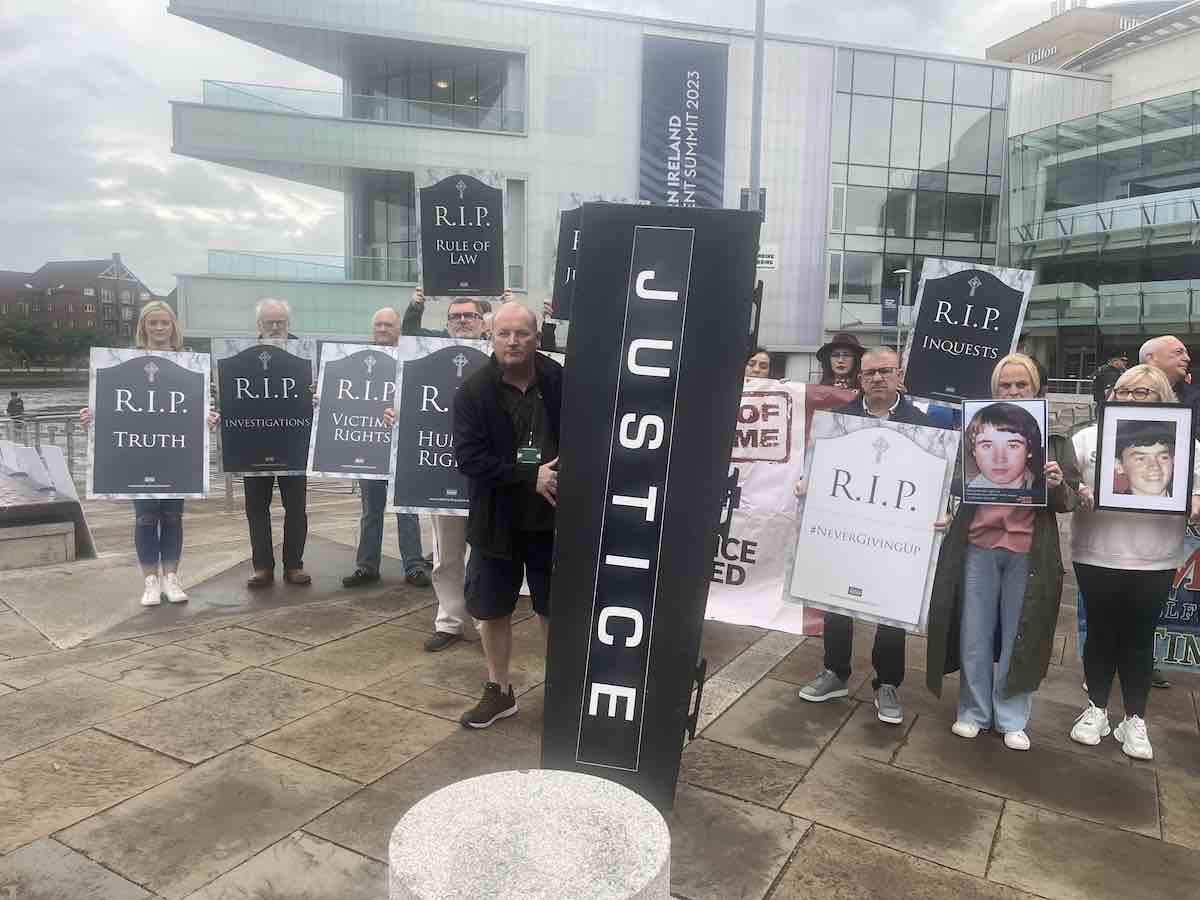
By Mark Thompson, CEO of Relatives for Justice (for the Irish News)
The age old saying “only victims know the true cost of war” is certainly apt as the Northern Ireland Troubles (Legacy and Reconciliation) Bill is railroaded through Westminster.
Camouflaged as reconciliation, this bill is the very antithesis of its disingenuous title.
It will create a new body, the Independent Commission for Reconciliation and Information Recovery (ICRIR). This body will be responsible to and directed by, when deemed necessary, the northern secretary of state. It will be divested of rights and ultimately powers. It will not be independent.
The bill will cause irrevocable damage to a society ravaged by decades of violence and injustice, further harming victims, adding intergenerational hurts and trauma.
It will embed distrust and prevent confidence in institutions of law and governance. To say that those behind this bill care little for the consequences would be generous.
This bill prohibits all criminal investigations, inquests, and civil litigation in respect to killings carried out during the conflict whilst simultaneously providing an amnesty to perpetrators through its immunity clauses. An unprecedented act for any so-called democracy save for tin-pot dictators and despot regimes.
This twin-track approach has attracted considerable international condemnation and not least from those tasked with ensuring the UK, as a signatory to international treaties and conventions, observes its legal obligations.
The immunity provisions are such that they constitute a ‘get out of investigation free card’.
The bill imposes a legal obligation that the ICRIR must grant immunity from prosecution when (A) a person has requested such immunity; (B) where the person has “provided an account which is true to the best of their knowledge and belief”; and (C) where the panel is satisfied the conduct described would appear to expose the person to prosecution for one or more serious Troubles-related offences.
This was dubbed ‘Pinochet plus’ by leading law academics. Even codified rights such as torture are within the immunity clause. So too is sexual violence should the UK government decide so; the definition is within their gift.
The potential for the bill to be weaponised by the UK government with powers being completely vested in a northern secretary are very concerning.
That decades of impunity resulting from poor to perfunctory investigations into state killings and collusion are now being addressed within the courts, through police and Police Ombudsman investigations, in inquests and civil litigation, goes some way to explaining the motivation behind the bill.
Several thousand cases are pending within these arenas where the focus is on all parties to the conflict – republicans, loyalists and state. It’s certainly uncomfortable for all.
Hence the scorched earth policy to rights, law, due process and the administration of justice. Rights sacrificed on the altar of protecting the ‘UK realm’ – God forbid reputational damage and narrative change should occur in Belfast courtrooms lifting the shadows of suspicion deliberately cast over victims unjustly, unlawfully, gunned down by British soldiers.
This is where accountability challenges impunity and where the primary intent of the bill becomes clearer and not least when involving the role played by Britain’s intelligence services in infiltrating and colluding with paramilitaries.
The argument that the current system isn’t working, and therefore the bill will free up those involved in violence, including the UK government and its agencies, to come forward and provide information, is fanciful and flies in the face of the evidence to date. It is a smokescreen.
The current system is working perfectly well – in fact too well – and the only shortcomings in the system are those deliberately generated by the UK government and its agencies as they routinely flout court orders to provide information, where obfuscation has become policy, where it destroys evidence and fails to trace witnesses/suspects who served in their armed forces. Not to mention its agents within paramilitaries.
This bill not only violates domestic and international law, but it also undermines the Good Friday Agreement hollowing out protections, rights, law and equality provisions.
It exposes why this Tory government abandoned the 2014 Stormont House Agreement on legacy with the Irish government and local parties, as that agreement was human rights compliant creating a completely independent body which it could not control fully.
The bill will be legally challenged. However, this will take time and in the intervening period many ageing relatives who had loved ones killed will die off awaiting truth and justice. Therefore, it also becomes a humanitarian issue. It is in this overall context that the Irish government could step forward and initiate an interstate case to Strasbourg.
![[Irish Republican News]](https://republican-news.org/graphics/title_gifs/rn.gif)
![[Irish Republican News]](https://republican-news.org/graphics/title_gifs/harp.gif)

